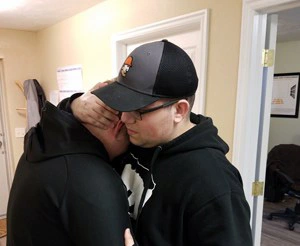
When it comes to suicide, there are many myths and stigmas surrounding the word. There is an average rate of 123 deaths by suicide per day, and the numbers are not dropping. Why are these numbers so high? There are many factors that are affecting its increase. Yet, the common factor that could potentially prevent a suicide is rarely used. What is it? It happens to be many little things, such as listening, reaching out, helping, and not feeding the stigma.
Death by suicide is the act on someone taking their own life. This can be caused by struggling with a mental disorder like depression, bipolar disorder. It can also happen to those under an excessive amount of stress that then leads to the person suffering from depression. This excessive stress can be caused from a job such as with the police force, military, and management positions. It can also be caused by those who are being bullied and treated quite negatively.
When it comes to preventing suicide, how can we help? To debunk some myths, asking someone if they are suicidal or have a plan to take their own life will not magically make them want to do it. Another myth is that all of those who take their lives want to die. In fact, they simply want to stop suffering and they feel that they are left with only this choice to stop the physical and/or emotional pain. Another myth is if a person is determined to take their own life, nothing is going to stop them. Even many of those who are severely depressed have mixed feelings about death and do waver between wanting to live or die.
So what are some of the warning signs of someone who may be suffering and contemplating suicide?
- Warning Signs:
- Talking about suicide (dying, self-harm, wishing they’d be better off dead)
- Seeking out lethal methods (access to guns, pills, knives, etc.)
- No hope for their future
- Self-loathing or hatred
- Withdrawing
- Getting their affairs in order
- Self-destructive behavior (alcohol/drug abuse)
These are some of the most common symptoms that can be observed from an indivudal who may be depressed and thinking about suicide. Many people say that they never knew that the person was struggling, but if they looked just a bit closer, they would have seen these signs clearly and could have stepped up to help. Once you notice these warning signs, what steps should you take? Check back in next week, and we will have Part Two in what prevention tips you can take to ensure that your loved one, friend, or workmate can get the help that they need.
Sucide Prevention Tips
Now that you have this knowledge in how to spot these signs, what can you do to help prevent this person from following through on it? Well first, you have to be sincere about helping them, otherwise it will come off poorly to the person struggling and can potentially make it worse. Below are some tips that you can utilize:
Speak up
- It can be difficult to talk to a friend or family member about their suicidal thoughts and feelings. If you are unsure if they are suicidal or not, the best way is to ask. An example is: “I wanted to check in with you because you haven’t seemed yourself lately.”
Respond Quickly In A Crisis
- If someone has told you that they are thinking about death or suicide, you need to evaluate the immediate danger that they are in. Those who are at the highest risk are those who have a plan set, and the means to carry out their plan. They also need to have a time to act on it and the intention to act.
- Low Risk: Some suicidal thoughts but no plan. They say that they will not attempt.
- Moderate Risk: Suicidal thoughts with an ambiguous plan and saying they will not attempt.
- High Risk: Suicidal thoughts with a plan that is specific and lethal but saying they will not attempt suicide.
- Sever Risk: Suicidal thoughts with a plan that has been planned specifically and lethal. Says that they will attempt to take their own life.
Offer Help and Support
- When someone is feeling suicidal, the best method to help is by offering to listen to them and being empathetic. You should let them know that they are not alone in the situation and that you care about them. Yet, remember that you can offer support to them, but you cannot make them better. They have to make the commitment to recover.
- Other methods to help
- Assist them in getting professional help
- Follow-up on the treatment (ensuring medication is taken, aware of side effects, etc.)
- Be Proactive (example: Instead of calling and telling them to call if they need anything, stop by, call them, or invite them to go out and do something with you)
- Encourage their positive lifestyle changes
- Remove potential objects for suicide (pills, knives, firearms, etc.)
There are many more methods to help those around you who may be struggling from suicidal thoughts. So long as you are proactive and show that you truly care and want to help, it can the step that will help prevent a suicide attempt.
If you or a loved one are struggling with depression and suicidal thoughts, you can get help at Suicide Hotline: 1-800-273-8255 or Chat Online With a Trained Representative at suicidepreventionlifeline.org
For More Detailed Information: helpguide.org
